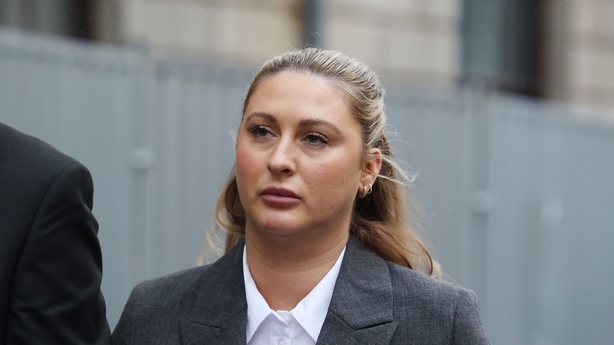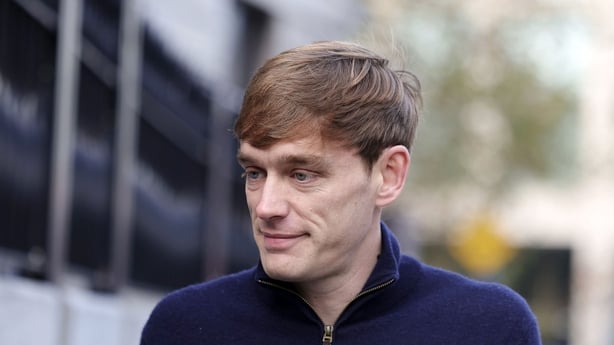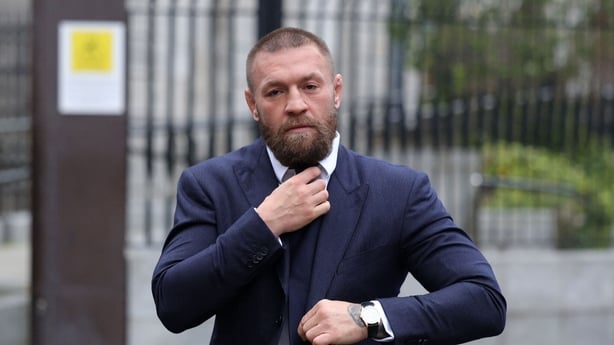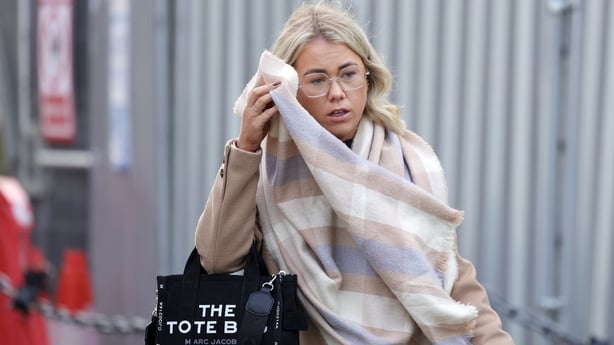A woman who has accused Mixed Martial Arts fighter Conor McGregor of rape will always be a marked woman, because she stood up to him, her lawyer has told the High Court.
Mr McGregor was described as a "devious coward" by a barrister acting for 35-year-old Nikita Hand, who has sued Mr McGregor and his friend James Lawrence for damages, claiming they raped her in a Dublin hotel in December 2018.
The men have denied the claims and said they had consensual sex with her.
Senior Counsel John Gordon told the jury that whatever they thought of her, the one thing they knew was that she had courage.
He said she was bitterly disappointed when the Director of Public Prosecutions decided not to prosecute in relation to her allegation of rape and it was not until after that happened that she began this civil action.
Mr Gordon said this remained her only avenue to vindication and people were entitled to pursue a civil action to vindicate their position.
If anyone needed to be vindicated it was his client, he said.
He said the abuse of Ms Hand did not just happen in the Beacon Hotel in December 2018, or during the garda investigation.
Mr Gordon said it continued in this litigation, in the pleadings and through the hearing of the case where Ms Hand was subjected to "arrogant, distasteful, dishonest testimony" from Mr McGregor.

"The abuse hasn't ended," Mr Gordon said, "it’s continuing".
Mr Gordon referred to the fact that Ms Hand was claiming the cost of buying a new house in a different location in her action.
He told the jurors that they knew she no longer lived in the area she had lived in, they knew she lived in fear, and they were entitled to consider the fact that she wanted and needed to get away from the area.
Receiving vindication from them would be a huge step, he said, but did not change what had happened and did not change the fact she would live with this for the rest of her days.
"It doesn’t change the fact that she will always be a marked woman, because she stood up to Conor McGregor," he said.
Mr Gordon said Ms Hand had not wanted to press charges originally. All she had wanted was to go to hospital to get the tampon taken out of her.
He said she had been criticised for deleting material from her phone, but he said she had done this because she was frightened.
He told the jurors that Mr McGregor and Mr Lawrence could not face the rock sitting in the middle of the case - that Ms Hand was badly beaten up on 9 December 2018 and Mr McGregor did it.
Mr Gordon drew the jury’s attention to the medical evidence about the severity of Ms Hand’s bruises and the fact that a tampon had to be removed from her using a forceps.
He said it was only when Mr McGregor was shown photographs of Ms Hand’s bruising during garda interviews in January 2019, that he had to face up to what he had done and began speculating that someone else must have caused the bruising.
Mr Gordon said Mr McGregor’s mask had slipped during his evidence.
He lost his temper, he said, and the court witnessed a stream of invective aimed directly across the courtroom at Ms Hand.
He reminded them that they were not just making their decision on the basis of documents, they had to assess the demeanour of witnesses.
He said Mr McGregor had laid his plans for having a "sex afternoon" at 4.30am when he got his driver to book the suite in the Beacon Hotel.
We need your consent to load this rte-player contentWe use rte-player to manage extra content that can set cookies on your device and collect data about your activity. Please review their details and accept them to load the content.Manage Preferences
He had been in Krystle nightclub with girls but they went home and Ms Hand became the substitute, Mr Gordon said.
He said it was "risible nonsense" and "absolute poppycock" to suggest that Mr McGregor had stayed overnight in the hotel to use the gym.
He said there was no answer to Mr McGregor's appalling behaviour.
He had initially suggested there was nothing more than rough, athletic sex but he had changed his evidence about how Ms Hand may have sustained her injuries while he was in the witness box, said Mr Gordon, and that Mr McGregor decided to reinvent his own defence case.
Mr Gordon said the more you build on lies, the more patently outrageous your case becomes.
He told the jury they had the common sense to realise they were being sold a pup by "this arrogant man".
Mr Gordon told them Mr Lawrence was "in cahoots" with Mr McGregor from the word go.
He had claimed he had "soft sex" with Ms Hand after Mr McGregor had left, to "confuse the narrative" and make Ms Hand out to be "an even bigger hussy" than they were trying to say she was anyway.
He said Mr Lawrence had rushed through his evidence, repeating mantras.

They were in collusion, he said, and were continuing to be in collusion to give the impression that Ms Hand was completely unaffected by her encounter with Mr McGregor.
Mr Gordon said Mr Lawrence was "inherently unreliable". He said he had suggested he had sex three times in an hour and the jury should use their own knowledge of the world to know what to make of that evidence.
He said Mr McGregor had repetitiously and venomously called Ms Hand a liar, but the liar was Mr McGregor who did not have the courage or the decency to own up to what he did.
He was a man who lived and thrived by the media, said Mr Gordon.
"What he should have done if he was a man at all, is apologise to my client for what he did to her that night," he said.
Mr McGregor was "not a man, he was a coward, a devious coward", Mr Gordon said, and they should treat him for what he was, before asking the jury to look again at the photographs of Ms Hand’s injuries.
He said there was plenty of medical evidence corroborating Ms Hand’s account of how she got her injuries.
Read more:
Jury in McGregor case told they are judges of fact
As it happened: Closing arguments made in McGregor case
He said he had been beaten in a fight two months earlier in Las Vegas and described him as being in "some temper" when he put Ms Hand in a stranglehold three times.
This was central to how he took control of her and would stay embedded in her memory for the rest of her days, he said.
Mr Gordon said if they found that Ms Hand had been assaulted they would have to consider categories of damages including general damages, medical expenses and damages marking the circumstances of the assault and disapproval of the way the defendant had conducted himself.
He said awarding punitive damages would be their opportunity to express their disapproval of what this man did.
He said the evidence that Mr McGregor assaulted Ms Hand was overwhelming, Mr McGregor’s story was unsound from the beginning and he had no doubt the jury would figure out fact from fiction.
Jury not being asked to invite McGregor to lunch - lawyer
Earlier Mr McGregor’s lawyer, Remy Farrell, told the jurors they must examine the evidence methodically, even if they all loathe Mr McGregor.
He told the eight women and four men on the jury that they could not decide the case based on their gut reaction or on the fact that they may not like Mr McGregor.
Mr Farrell said Mr McGregor was someone who was hard to avoid and who elicited strong views.
"Some people love him," he said, "some people very much do not love him and there is no getting away from that."
Mr Farrell said it may well be the case that some members of the jury had negative views about him before they even sat in the case - he said some, even all of them may loathe him.
Mr Farrell said they had heard the intake of breath from the jury when Mr McGregor referred to "two lovely ladies" in his evidence or when he had described Ms Hand as "somewhat bombastic" or the hand gestures he had made when talking about "provocative" pictures.
He told them they may also be unimpressed with a man who leaves the family home on a Saturday night, goes into town and ends up drinking with women in hotel penthouses.
But he said he was not there to ask them to like Mr McGregor or invite him to Sunday lunch.
He said he was asking them to look at the evidence and interrogate their own views.
They should give his case the same consideration they would give to other cases, he said, work their way methodically through the evidence and examine it.
Mr Farrell told them to look at the CCTV footage and the text messages they had available to them and cross reference what was happening at certain times.
He said they should take objective pieces of evidence that did not lie, what lawyers call "islands of fact", and see how everything else slotted in.
He said they should not be concerned with the consequences of their decision.
They had to answer the question: "Did Mr McGregor assault Ms Hand?"
They were not concerned with broader questions, he said. If they find for Mr McGregor it would be devastating for Ms Hand, and if they found for Ms Hand it would be devastating for Mr McGregor.
In any case like this there is a winner and a loser, Mr Farrell said.

He said they could not approach the case on the basis of who they would like to win or who they did not want to see lose.
Mr Farrell said they should look at specific issues and ask if something probably or probably did not happen.
He said they should ask themselves what the position would be if the CCTV footage at the Beacon Hotel had not been gathered. Would it be a criminal or a civil case, he asked.
Mr Farrell said the entirety of Ms Hand’s case was that it was all very simple, that she was raped and had the bruises to prove it and everything else was a distraction.
Mr Farrell said he was suggesting they look at what she had told her friend Emer Brennan on the night of 10 December.
He said she had tried to airbrush her friend Danielle Kealey, who was also at the Beacon Hotel, out of the case and had given Ms Brennan an "elaborate fabrication".
He said they should also count the number of lies she told her boyfriend when she got home, in a conversation he recorded.
Mr Farrell said everyone tells lies but he told the jury it was more interesting to examine why someone tells lies.
He asked the jury to look at the whole picture. He said they should ask themselves what a case like this looked like if examined from the premise that a person is lying.
He said Ms Hand had been "happy, happy, happy" but as soon as she knew she had to go home and face the music, that was when the allegations began.
And he said they could not ignore that.
Mr Farrell asked the jury to examine Ms Hand’s claims that she did not know whether she was in a hotel in Sandyford in Dublin or in Temple Bar.
He also pointed out that she said she would never have had sex with Mr Lawrence when CCTV shows "much affection" from her to him.
He said the CCTV footage from the hotel did not show Ms Hand in any discomfort from a tampon, compared with the CCTV footage the next morning in the ambulance.
In relation to Mr Lawrence, Mr Farrell said it was extraordinary that someone could bring someone to court and say they had raped them but then tell the court they did not believe they even had sex with him.
He said that was something the jury would have to think about. He said they would have to make their own minds up about whether Ms Hand was drunk and vulnerable in the CCTV footage.
Mr Farrell said Ms Hand was well able to lie and said the most important lie was one she texted to her boyfriend from the basement of the Beacon Hotel saying she was still out and very drunk, followed by a "little victory dance".
He said this was not what she told gardaí or the jury about texting her boyfriend.
Mr Farrell asked the jury to consider the evidence of Ms Hand’s friend Ms Kealey. He said they may find it surprising that she was not called to give evidence by Ms Hand’s lawyers.

He said Ms Hand seemed to have understood from an early stage that Ms Kealey would not back her up.
He said there was an attempt by lawyers for Ms Hand to suggest that Ms Kealey had been "nobbled" and that there was some kind of conspiracy where she had been scared off or paid off.
But he said Ms Kealey confirmed that Ms Hand had shown no signs of distress and was in good form without any bruises.
He asked the jury to look at what Ms Hand remembered and did not remember. He said she seemed to remember the traumatic event but not the other innocent bits and pieces around it which did not corroborate her account.
He said it was a carefully put together account.
He asked the jury again to look at the "islands of fact".
He said the fact that many of them may not like Mr McGregor was not surprising, but asked should it matter.
"If this were someone other than Mr McGregor, would the door of the jury room hit you on the backside before you were out again to dismiss this case?" he asked them.
Lawrence putting himself into case 'a hell of a risk'
Senior Counsel, John Fitzgerald, on behalf of Mr Lawrence, said his client had none of the fame or notoriety of Mr McGregor.
He had lived in relative obscurity up to now and would like to return to it, he said.
Mr Fitzgerald said one thing everyone could agree on was that there was a media storm about a sports star allegedly raping a woman in a Dublin hotel.
He asked who would make up a story to put themselves in that frame, as his client was being accused of doing.
He said Mr Lawrence could not have known the CCTV footage or Ms Kealey would support the important part of his version of events.
And he said putting himself into the case "was a hell of a risk to take".
Mr Fitzgerald urged the jury to look at the different versions of events given by Ms Hand and the two men.
He asked if her periods of "remembering and not remembering" were plausible.
He said the CCTV footage did not bear out her evidence that she did not want to have sex with Mr Lawrence and showed her initiating affectionate contact and exhibiting no signs of distress.
He said it wholly supported Mr Lawrence’s account and wholly contradicted Ms Hand’s.
He said Ms Hand had claimed the footage showed a drunk, vulnerable woman, but Mr Fitzgerald said they were talking to people, she was seen pressing buttons in a lift and sending texts.
He said it did not show someone with no agency or no control, but someone well able to function and "well able to calculate the effect of her lies".
Mr Fitzgerald said the case against his client was "bizarre" and urged the jury to accept Mr Lawrence’s account.







